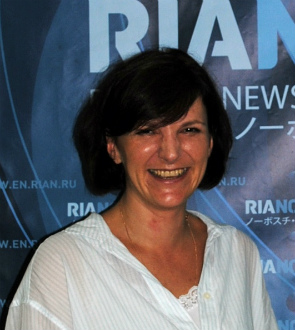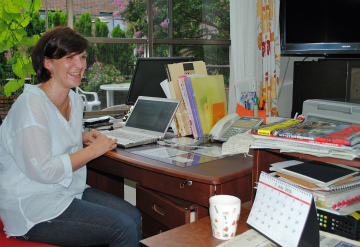Ms. Ksenia Naka, Tokyo Bureau Senior Correspondent, RIA Novosti (Russia)
Ms. Ksenia Naka, Tokyo Bureau Senior Correspondent
RIA Novosti
 “I want to report news on both Russia and Japan, in which there are great similarities,” says Ms. Ksenia Naka, who has worked in the Tokyo Bureau of RIA Novosti since 2008. Interviewed her about the experience of working in Japan as a journalist and her observation of Japan.
“I want to report news on both Russia and Japan, in which there are great similarities,” says Ms. Ksenia Naka, who has worked in the Tokyo Bureau of RIA Novosti since 2008. Interviewed her about the experience of working in Japan as a journalist and her observation of Japan.
-Why did you come to Japan?
Through my sister’s influence, I was attracted to Japanese literature. I studied Japanese language and history at Moscow State University and then worked as an interpreter and a coordinator for arranging interviews and reporting for Japanese media. With each passing moment, my wish to report my own messages in my own words grew. This eventually made me work as a journalist in RIA Novosti. Now, I am doing what I had been longing to do.
~ 3.11 has changed my philosophy of life ~
-What has been your most impressive work as a journalist so far?
The March 11 disaster in 2011. About two months later, I visited the disaster site to report on the efforts of Russian people living in Japan to bring relief supplies. I cannot forget what I saw in Onagawa, Miyagi Prefecture, which was almost surreal; I felt as if I were in a movie scene or a museum. I was terribly shocked. In November 2011, I visited Miyagi on an FPCJ Press Tour. The fishermen in Ogatsu positively said, “We have nothing more to lose. We will start over.” Their plucky attitudes and words still give me goose-bumps. I admired their strength and wanted to become like them and to report on them. Their ideas are not that they have to recover what they lost, but that they would create a better community than the one before the disaster. Mr. Toyo Ito also expressed the same ideas at an FPCJ Press Briefing. The disaster has changed my philosophy of life and how I view Japan.
-Do you face any difficulties in reporting?
At around the time of the disaster, foreign media got more or less panicky, unfortunately. After the accident of the Fukushima No. 1 Nuclear Power Plant, some gave false reports such as “Tokyo is now a ghost town.” I did not write that there was no problem, of course, but I tried not to incite fears too much without evidence, and to be mindful that my article would not be edited in such a way. I struggled very much, as there was much information that I could not confirm; little public information on the one hand, and much unauthentic info on the other hand.
-What are your main fields of interest?
I want to visit Tohoku every year to monitor and report on how the region will change since the disaster. The experience of overcoming the tragedy must be precious lessons not only for the Japanese people but also for the world. In addition, I am interested in leading-edge technique, especially in robots. Japan has the capacity to change the mindsets in a way the rest of the world would not even imagine. I also have a keen interest in iPS cells.
~ Japan should take its own stand more clearly ~
-How do you see Japan?
When I visited Japan for a short time, I was surprised at how convenient this country was. However, after I started to live here as a resident, I have realized how patient Japanese people are in their daily lives. This patience has made Japan become rich, I think. Besides, the national character of Japan is perfectionism. Individuals work very hard and highly efficiently, but when organized as an institution or a group, it takes quite long time to proceed with something. Japanese people may be weak in unforeseen situations which go beyond the everyday-sharing of responsibility and for which they have no manual.
-How do you feel about sending information from Japan?
Japan is not good at projecting itself. It is of course great to introduce Japanese culture like animation, but there is a limit to such a promotion. In the field of diplomacy, Japan should take its own stand a little more clearly, though I understand the importance of the Japan-U.S. alliance. If Japan can put forward a definite opinion as a member of an open and broad world, it will become an influential political player, who is asked for to give feedback on each subject. Since Japan is highly deserved and can contribute more to the world, holding back is mottainai, or a waste.
-What do you seek from FPCJ?
Press tours are really helpful. I, as an individual, cannot plan and coordinate trips to regions far from Tokyo with such an extremely dense schedule just for a day or two, and at very low prices. I always get good materials and tips that can be directly reflected in my articles. I hope that FPCJ continues to hold such unique tours; it will also be nice to conduct questionnaires to foreign journalists on their interests.
Ms. Ksenia Naka, Tokyo Bureau Senior Correspondent
Born in March 1970. Originally from Moscow, Russia. Majored in Japanese language, Japanese history, and world history at the Moscow State University, the Institute of Asian and African Studies. Studied in Japan for a short time. After graduation, worked as a coordinator and interpreter for Japanese TV stations and others. Came to Japan with her husband in 2001. In 2008, started to work as a stringer of the RIA Novosti to monitor and send information on the coverage of the Japanese media. Since 2011, became a correspondent in Tokyo. Lives in Tokyo with her husband and two sons.
Started as the Soviet Information Bureau in 1941, to report the frontline information of the war. As a news service, covers international news and provides wire reports in 14 languages including Japanese. Since 2000, has promoted the use of multimedia including online live coverage. Visitors to its website come to about 20 million a month. The Tokyo Bureau has two staff members; three members in total in Japan. The Bureau also covers North and South Korea.



